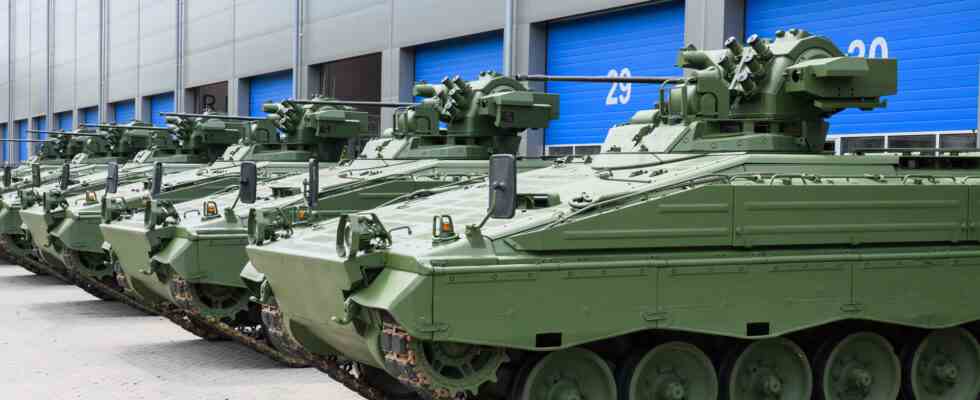Status: 01/21/2023 12:26 p.m
German armaments companies like Rheinmetall do not only benefit financially from the war in Ukraine. They force an image change towards “crisis helpers”. But the policies of the federal government also lead to problems.
Rheinmetall does not want to see itself as a “war profiteer”. Rather, they are “crisis helpers,” CEO Armin Papperger likes to emphasize in interviews. However, a look at the Düsseldorf armaments company’s share price suggests that Rheinmetall benefited significantly from the Ukraine war.
Boost on the stock market, hundreds of new jobs
With the beginning of the war last February, the course jumped up. The market value is now more than twice as high as it was a year ago. Rheinmetall could soon even be included in the DAX, one of the 40 largest listed companies in Germany. This is made possible because the industrial gases group Linde is leaving the Frankfurt Stock Exchange and will only be listed in the USA in the future.
According to Rheinmetall, it has hired 1,200 new employees since the beginning of the war. The company has around 30,000 employees worldwide, around half of them in Germany. The armaments group, which produces military vehicles, ammunition and air defense systems, among other things, is also growing in other areas. A new ammunition factory is being built in Hungary, and the company is taking over an ammunition manufacturer in Spain. For the coming years, Rheinmetall is anticipating sales growth of 15 to 20 percent per year in the military business.
“You need your own armaments industry”
For the German federal government, Rheinmetall is indeed a kind of crisis helper: One dimension of the crisis is the poor state of the Bundeswehr, which the government wants to improve with a 100 billion euro program. However, the purchase of armaments is sluggish. In the first quarter of the year, negotiations on land vehicles for the Bundeswehr should be concluded, Rheinmetall boss Papperger told the “Bild am Sonntag” last week.
The times of crisis are also accompanied by an increased appreciation for the industry. The relationship with the domestic armaments industry in Germany has long been associated with a “guilty conscience,” says Christian Mölling, armaments expert at the German Society for Foreign Relations. From his point of view it is clear: “You need your own armaments industry, otherwise you are dependent on other nations.”
Poland prefers to order in South Korea
Foreign business also traditionally plays a major role at Rheinmetall, accounting for two-thirds of sales. But here, too, the company is dependent on support from the federal government – on the one hand because it needs permits for the export of armaments; on the other hand, because the reputation of the German armaments industry cannot be separated from the perception of Germany in geopolitics.
At the moment, however, Germany is perceived by many allies as an unreliable partner – because of its reluctance to deliver arms to Ukraine. The example of Poland shows how badly the image of the German armaments industry suffers as a result. Poland prefers to stock up in South Korea instead of at the neighbour’s. The Polish government has ordered around a thousand main battle tanks there, as well as howitzers and combat aircraft.
“The Poles have noticed that you simply can’t make a state with the Germans,” says armaments expert Mölling. He doesn’t see the blame for this with manufacturers like Rheinmetall, but with the federal government. According to Mölling, the state and industry should go hand in hand when it comes to the armaments business: “It doesn’t make business easier for Rheinmetall if there is little support from politicians.”
problem child “cougar”
The breakdowns in the “Puma” infantry fighting vehicle, which Rheinmetall built together with its competitor and cooperation partner Krauss-Maffei Wegmann (KMW), caused image damage for the Düsseldorf-based company. In mid-December it became known that all 18 “Puma” tanks involved in a shooting exercise by the German Armed Forces failed.
Rheinmetall later described most of the damage as “trifles”. Just two weeks after the incident, the company reported that 17 of the 18 tanks had been made roadworthy again.
At the Rheinmetall plant in Unterlüß (Lower Saxony), an employee assembles parts of the Puma infantry fighting vehicle
Image: picture alliance / dpa
New business with “Leopard” tanks?
When it comes to repairs, the company could soon be needed again – if the federal government were to actually deliver “Leopard” battle tanks to Ukraine. Although the Leopard is not manufactured by Rheinmetall, the company bought Leopard 1 and 2 tanks years ago. If necessary, they could make it fit for use in the Ukraine.

